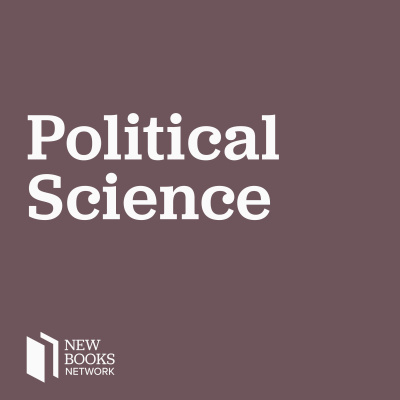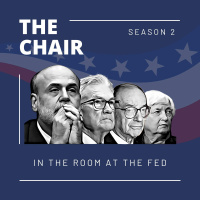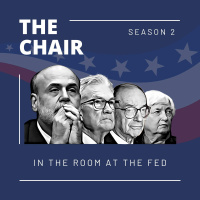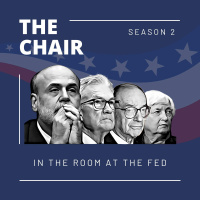Sinopsis
Interviews with Political Scientists about their New Books
Episodios
-
Postscript: Calibrating the Outrage-Democratic Erosion, Legality, and Politics
19/05/2025 Duración: 44minWe’ve been focusing on the dynamics of democratic backsliding in the United States and beyond. In this episode of Postscript: Conversations on Politics and Political Science, Susan talks the co-founder and co-director of the Democratic Erosion Consortium, Dr. Robert Blair about how the Consortium offers FREE resources to teachers, students, journalists, policy makers, and any interested person – including shared syllabus, readings, assignments, YouTube virtual roundtables, and policy briefs. Rob defines democratic erosion and offers critical insights on the importance of interdisciplinarity, calibrating outrage, and distinguishing between policy disputes and the erosion of democracy. He offers a clear-headed analysis of what is legal v. what breaks down democracy that is not to be missed. We conclude with thoughts on what everyone can do protect democracy. Dr. Robert Blair is Associate Professor of Political Science and International and Public Affairs at Brown University and co-founder and co-director of th
-
Globalization's Backlash: Echoes of the Interwar Era in Today’s World
18/05/2025 Duración: 35minThis week on International Horizons, RBI Director John Torpey interviews historian Tara Zahra, author of Against the World: Anti-Globalism and Mass Politics Between the World Wars (W.W. Norton, 2023). Zahra reflects on the historical parallels between the current backlash against globalization and the anti-globalist movements of the interwar period. She highlights how economic insecurity, the rise of mass politics, and anxieties over immigration and trade shaped political reactions in both eras, while noting key differences—such as the role of environmentalism today and the absence of a world war in recent memory. Zahra also discusses the collapse of the international economic system in the 1930s, the ideological diversity of anti-globalist movements, and the legacy of Bretton Woods. She proposes that revisiting elements of the post-WWII international order, including regional cooperation and economic stabilization, may offer insight into managing today’s fractured global landscape. Learn more about your ad c
-
Make Britain Great Again? The MAGA-Style Rise of Reform UK
17/05/2025 Duración: 42minBritain's Conservative Party is one of the oldest and most successful political parties in history. Local elections in the UK have signalled that they are facing the prospect of being wiped out, imperilled by the rise of the right-wing Reform Party, headed by one of the most pervasive and divisive figures in British politics: Nigel Farage. Reform’s success is also coming at the expense of Labour, whose voters are underwhelmed and unconvinced by the performance so far of Prime Minister Keir Starmer’s government. Hosts Nina Dos Santos and Owen Bennett Jones explore what makes Reform such a potent political threat that they could upend 100 years of Labour and Conservative rule, charting the party's rise from UKIP to Brexit to now. They speak to Gawain Towler, former Reform spokesperson and close political confidant of Nigel Farage, and Ben Habib, formerly deputy leader of Reform two men who understand the soul of the movement and the man who leads and embodies the party: Nigel Farage. Producer, Pearse L
-
Ruth Braunstein, "My Tax Dollars: The Morality of Taxpaying in America" (Princeton UP, 2025)
16/05/2025 Duración: 01h13minIn My Tax Dollars: The Morality of Taxpaying in America (Princeton University Press, 2025), Ruth Braunstein maps the contested moral landscape in which Americans experience and make sense of the tax system. Braunstein tells the stories of Americans who view taxpaying as more than a mundane chore: antigovernment tax defiers who challenge the legitimacy of the tax system, antiwar activists who resist the use of their taxes to fund war, antiabortion activists against “taxpayer funded abortions,” and a diverse group of people who promote taxpaying as a moral good. Though taxpaying is often portrayed as dull and technical, exposure to collective rituals, civic education, propaganda, and protest transforms the practice for many Americans into either a sacred rite of citizenship or a profane threat to what they hold dear. These sacred and profane meanings can apply to the act of taxpaying itself or to the specific uses of tax dollars. Despite intense disagreement about these meanings, politically diverse Americans
-
Lara Montesinos Coleman, "Struggles for the Human: Violent Legality and the Politics of Rights" (Duke UP, 2023)
15/05/2025 Duración: 01h13minIn Struggles for the Human: Violent Legality and the Politics of Rights (Duke University Press 2024), Lara Montesinos Coleman blends ethnography, political philosophy, and critical theory to reorient debates on human rights through attention to understandings of legality, ethics, and humanity in anticapitalist and decolonial struggle. Drawing on her extensive involvement with grassroots social movements in Colombia, Coleman observes that mainstream expressions of human rights have become counterparts to capitalist violence, even as this discourse disavows capitalism’s deadly implications. She rejects claims that human rights are inherently tied to capitalism, liberalism, or colonialism, instead showing how human rights can be used to combat these forces. Coleman demonstrates that social justice struggles that are rooted in marginalized communities’ lived experiences can reframe human rights in order to challenge oppressive power structures and offer a blueprint for constructing alternative political economies
-
What is environmental authoritarianism and why we should be mindful of its allure
14/05/2025 Duración: 37minThe argument that authoritarian governments are better at dealing with the climate emergency is gaining ground, fuelled by the idea that undemocratic states face fewer constraints and so can operate more efficiently and effectively. Some are even arguing that this isn’t just a necessary evil but a legitimate policy response to pending environmental catastrophe. Yet the data suggests that on average authoritarian governments do not perform better, and on many measures actually do worse than democracies. So why does this idea persist? Join Nic Cheeseman as he talks to Nomi Claire Lazar and Jeremy Wallace about their new article on Resisting the Authoritarian Temptation. Why is democracy not delivering? Why is authoritarianism not the answer? And what new models exist that can be used to deliver a greener and more inclusive future? This podcast is part of our regular collaboration with the Journal of Democracy. Guest: Nomi Claire Lazar is a Professor of Politics in the Graduate School of Public and Internati
-
Katherine Stewart, "Money, Lies, and God: Inside the Movement to Destroy American Democracy" (Bloomsbury, 2025)
13/05/2025 Duración: 57minToday, and for the past several years, many people both here and abroad have been trying to make sense of the radical right and its financial and ideological grip on the Republican party. Why is it that so many Americans have turned against democracy? What explains the authoritarian reaction of so many American citizens, even when that reaction works so directly against their basic interests? How is it that this anti-democratic trend has escaped the explanatory frameworks of pundits and scholars alike? Perhaps we need to re-frame the narrative about the MAGA movement and the various constituencies that have somehow conspired to undermine democratic values and replace them with radical libertarian principles joined by theocratic, White nationalist, and anti-intellectual ideals. Addressing these concerns, Katherine Stewart has written Money, Lies, and God: Inside the Movement to Destroy American Democracy (Bloomsbury Press, 2025). Casting a light on the religious right’s “Funders, Thinkers, Sergeants, Infantr
-
Constitutional Crisis or a Stalemate?
12/05/2025 Duración: 46minAt the 100 day mark of Donald Trump’s second term as president, the political scientists at Bright Line Watch released their 25th report on the state of American democracy entitled “Threats to democracy and academic freedom after Trump’s second first 100 days.” Based on polling both experts (760 political scientists) and the public (representative sample of 2000 Americans), the Bright Line Watch researchers find that the Trump administration has challenged constitutional and democratic norms on a wide range of issues, including the scope of executive power and the authority of courts to check it, individual freedom of expression, due process and habeas corpus, immigration, and academic freedom. In this episode of POSTSCRIPT: Conversations on Politics and Political Science, two of Bright Line Watch’s co-directors analyze the latest report – and what it means for American democracy. Topics include democratic performance, threats to democracy and academic freedom and self-censorship. Dr. John Carey (he/him) is
-
Threats to Universities and What We Can Do: A Conversation with Brandice Canes Wrone
12/05/2025 Duración: 01h09sUniversities are under attack, but what exactly are the threats? How does free speech in the last 10 years compare to today? What do we stand to lose if higher education collapses? In this episode, Brandice Canes-Wrone dives into the major threats facing universities—from defunding to restrictions on free expression—and what we can do to solve them. We explore the history of universities, from their religious roots to the transformative impact of the GI Bill, examine how America’s global leadership is tied to the strength of its higher education system, and discuss why universities must remain vital spaces for intellectual experimentation, free inquiry, and personal growth. Madison’s Notes is the podcast of Princeton University’s James Madison Program in American Ideals and Institutions. Contributions to and/or sponsorship of any speaker does not constitute departmental or institutional endorsement of the specific program, speakers or views presented. Learn more about your ad choices. Visit megaphone.fm/ad
-
Catching the China-Europe Express: Logistics, Local Agency & Eurasian Geopolitics in the Polish Borderlands
11/05/2025 Duración: 58minIn this episode, we focus on the often-overlooked geographies of Eurasian connectivity with Dr. Wojciech Kębłowski, whose research brings attention to the Polish border towns of Małaszewicze and Narevka, key yet rarely discussed nodes in global infrastructure networks. As Eurasia undergoes a dramatic reconfiguration—with initiatives like China’s Belt and Road Initiative, the India-Middle East-Europe Corridor, and numerous regional projects vying for influence—we discuss what happens at the edges. How are logistics nodes developed? Who lives in these nodes of connection, and how do they navigate the shifting tides of global ambition? Our conversation spans local politics, logistics, labor, railway connectivity, and geopolitics, offering a multidimensional view of border hubs where the global meets the local. These sites are not only shaped by supply chain logics but also by mounting geopolitical rivalries, as powers compete for infrastructural influence across continents. Dr. Kębłowski paints a vivid picture
-
Alan Chong, "The International Politics of Communication: Representing Community in a Globalizing World" (U Michigan Press, 2025)
10/05/2025 Duración: 01h16minIn an era of globalization, international communication constantly takes place across borders, defying sovereign control as it influences opinion. While diplomacy between states is the visible face of international relations, this “informal diplomacy” is usually less visible but no less powerful. Information politics can be found in propaganda, Internet politics, educational exchanges, tourism, and even popular film. In The International Politics of Communication: Representing Community in a Globalizing World (University of Michigan Press, 2025) by Dr. Alan Chong examines this informational dimension of international politics, investigating how information is generated, conveyed through channels, and directed specifically at audiences. While citizens are often portrayed as faithfully loyal supporters and beneficiaries of the modern nation-state—a fiction supported by passports, identification papers, and other notarized credentials—they are subject to the pulls of loyalty from transnational tribal affiliatio
-
Democracy for Sale: Death by Dark Money
09/05/2025 Duración: 01h11minOn this edition of Ctrl Alt Deceit: Democracy in Danger, we are live at the Royal United Services Institute. Nina Dos Santos and Owen Bennett Jones are joined by a world-class panel to discuss the dangers posed by the waves of dark money threatening to overwhelm our democratic institutions.Panelists:--Tom Keatinge, Director, Centre for Finance and Security, RUSI--Darren Hughes, Chief Executive, Electoral Reform Society--Gina Neff, Executive Director, Minderoo Centre for Technology & Democracy at the University of Cambridge, and Professor of Responsible AI, Queen Mary University London Producer: Pearse Lynch Executive Producer: Lucinda Knight Learn more about your ad choices. Visit megaphone.fm/adchoices Support our show by becoming a premium member! https://newbooksnetwork.supportingcast.fm/political-science
-
Diana Graizbord, "Indicators of Democracy: The Politics and Promise of Evaluation Expertise in Mexico" (Stanford UP, 2024)
08/05/2025 Duración: 52minThe spread of democracy across the Global South has taken many different forms, but certain features are consistent: implementing a system of elections and an overarching mission of serving the will and well-being of a country's citizens. But how do we hold politicians accountable for such a mission? How are we to understand the efficacy of the policies they put forth? In Indicators of Democracy (Stanford UP, 2024), Diana Graizbord exposes the complex, often-hidden world of the institutions that are meant to ensure democratic accountability and transparency. Taking the case of Mexico's National Council for the Evaluation of Social Development Policy (CONEVAL), Graizbord provides a deep theory of what happens when democratic aspirations intersect with technocratic ambitions. Analyzing what it takes to establish and sustain monitoring and evaluation as a form of official state expertise, Graizbord is able to put forward the contours of technodemocracy—a democratic political project that hinges on the power of
-
Martin Thomas, "The End of Empires and a World Remade: A Global History of Decolonization" (Princeton UP, 2024)
07/05/2025 Duración: 48minEmpires, until recently, were everywhere. They shaped borders, stirred conflicts, and set the terms of international politics. With the collapse of empire came a fundamental reorganization of our world. Decolonization unfolded across territories as well as within them. Its struggles became internationalized and transnational, as much global campaigns of moral disarmament against colonial injustice as local contests of arms. In this expansive history, Martin Thomas tells the story of decolonization and its intrinsic link to globalization. He traces the connections between these two transformative processes: the end of formal empire and the acceleration of global integration, market reorganization, cultural exchange, and migration. The End of Empires and a World Remade: A Global History of Decolonization (Princeton UP, 2024) shows how profoundly decolonization shaped the process of globalization in the wake of empire collapse. In the second half of the twentieth century, decolonization catalyzed new internat
-
Time to Rethink Democracy: Participatory and More-Than-Human Perspectives
06/05/2025 Duración: 39minThis is a special episode that features a conversation between Sonia Bussu and Hans Asenbaum on democracy, capitalism, climate and the practices and prospects of participatory, deliberative and more-than-human democracy to transform their relationship. Can we rethink democracy beyond the liberal-democratic institutions that were created as part of the bargain for fossil-fuel-driven, Western-centric economic growth? What does and could democratic participation look like? What does it mean to include the non-human in our understanding of democracy? Sonia Bussu is Associate Professor in Public Policy at the University of Birmingham. She researches participatory democracy and in her work she uses participatory and creative methods for research and public engagement. She has led on projects on youth participation to influence mental health policy, youth employment policies, as well as coproduction of research on health and social care integration, and leadership styles within collaborative governance. She is scie
-
Stephen H. Legomsky, "Reimagining the American Union: The Case for Abolishing State Government" (Cambridge UP, 2024)
05/05/2025 Duración: 59minSince American president Donald Trump was elected to a second term, it is common to hear citizens, journalists, and public officials distinguish between the laws and leaders of their states and the national government. Those who oppose Trump’s policies with regard to reproductive rights, gun violence, LGBTQ+, education, police, and voting often present state constitutions, courts, laws, culture, and leaders as a bulwark against Trump’s autocratic rule. But Professor Stephen H. Legomsky sees it differently. His new book, Reimagining the American Union: The Case for Abolishing State Government (Cambridge University Press 2025) argues that – if we care about democracy – we should imagine an America without state government. No longer a union of arbitrarily constructed states, the country would become a union of one American people. Reimagining the American Union understands state government as the root cause of the gravest threats to American democracy. While some of those threats are baked into the Constituti
-
Jerome Powell: “We don't think you're a straight shooter"
04/05/2025 Duración: 51minMore than any one institution, the US Federal Reserve drives global capital markets with its decisions and communications. While its interest rates are set by a committee, for almost a century, the Fed’s philosophy and operational approach have been moulded by one person: the Chair of the Board of Governors. In the first series of The Chair, Tim Gwynn Jones talked to authors of books about the Fed's foundational Chairs – Marriner Eccles, Bill Martin, Arthur Burns, and Paul Volcker. In this second series, he covers the people who chaired the Fed through the post-1990 period of financialisation, globalisation, and – perhaps today – deglobalisation. This eighth and final episode covers the life and times of the current chair, Jerome ("Jay") Powell - the technocratic lawyer-turned-banker who managed the global economy through two unprecedented disasters: the Covid pandemic and Donald Trump’s protectionist trade policies. As the episodes about Martin, Burns, and Volcker all attest, Powell isn't the first chairma
-
Janet Yellen: “She had a view that the world was on fire”
03/05/2025 Duración: 59minMore than any other single institution, the US Federal Reserve drives global capital markets with its decisions and communications. While its interest rates are set by a committee, for almost a century, the Fed’s philosophy and operational approach have been moulded by one person: the Chair of the Board of Governors. In the first series of The Chair, Tim Gwynn Jones talked to authors of books about the Fed's foundational Chairs – Marriner Eccles, Bill Martin, Arthur Burns, and Paul Volcker. In this second series, he covers the people who chaired the Fed through the post-1990 period of financialisation, globalisation, and – perhaps today – deglobalisation. The third episode of the second series covers Janet Yellen – not only the first woman to become Fed Chair but the first person of either sex to lead the Fed, the Treasury, and the Council of Economic Advisors. To discuss Ben Bernanke’s successor, Tim is joined by Jon Hilsenrath, author of Yellen: The Trailblazing Economist Who Navigated an Era of Upheaval
-
Ben Bernanke: “Like being a paleontologist”
02/05/2025 Duración: 44minMore than any other single institution, the US Federal Reserve drives global capital markets with its decisions and communications. While its interest rates are set by a committee, for almost a century, the Fed’s philosophy and operational approach have been moulded by one person: the Chair of the Board of Governors. In the first series of The Chair, Tim Gwynn Jones talked to authors of books about the Fed's foundational Chairs – Marriner Eccles, Bill Martin, Arthur Burns, and Paul Volcker. In this second series, he covers the people who chaired the Fed through the post-1990 period of financialisation, globalisation, and – perhaps today – deglobalisation. Episode two of the second series covers the life and crisis-era times of Ben Bernanke, the man who filled Alan Greenspan’s big shoes and ran the Fed from 2006 to 2014. A shy but world-renowned monetary economist and historian of the Great Depression, Bernanke was left holding the proverbial bomb when the financial system came close to collapse in 2008. To
-
Alan Greenspan: “The man who knew”
01/05/2025 Duración: 49minMore than any other single institution, the US Federal Reserve drives global capital markets with its decisions and communications. While its interest rates are set by a committee, for almost a century, the Fed’s philosophy and operational approach have been moulded by one person: the Chair of the Board of Governors. In the first series of The Chair, Tim Gwynn Jones talked to authors of books about the Fed's foundational Chairs – Marriner Eccles, Bill Martin, Arthur Burns, and Paul Volcker. In this second series, he covers the people who chaired the Fed through the post-1990 period of financialisation, globalisation, and – perhaps today – deglobalisation. The first episode of the second series explores Alan Greenspan, the chairman who followed Paul Volcker and ran the Fed from 1987 until 2006. Once bestowed with “Maestro” status, Greenspan – who turns 100 in March 2026 – has seen his reputation deflate in the wake of the post-2008 financial crisis. To discuss the fallen Maestro, Tim is joined by Sebastian M

















